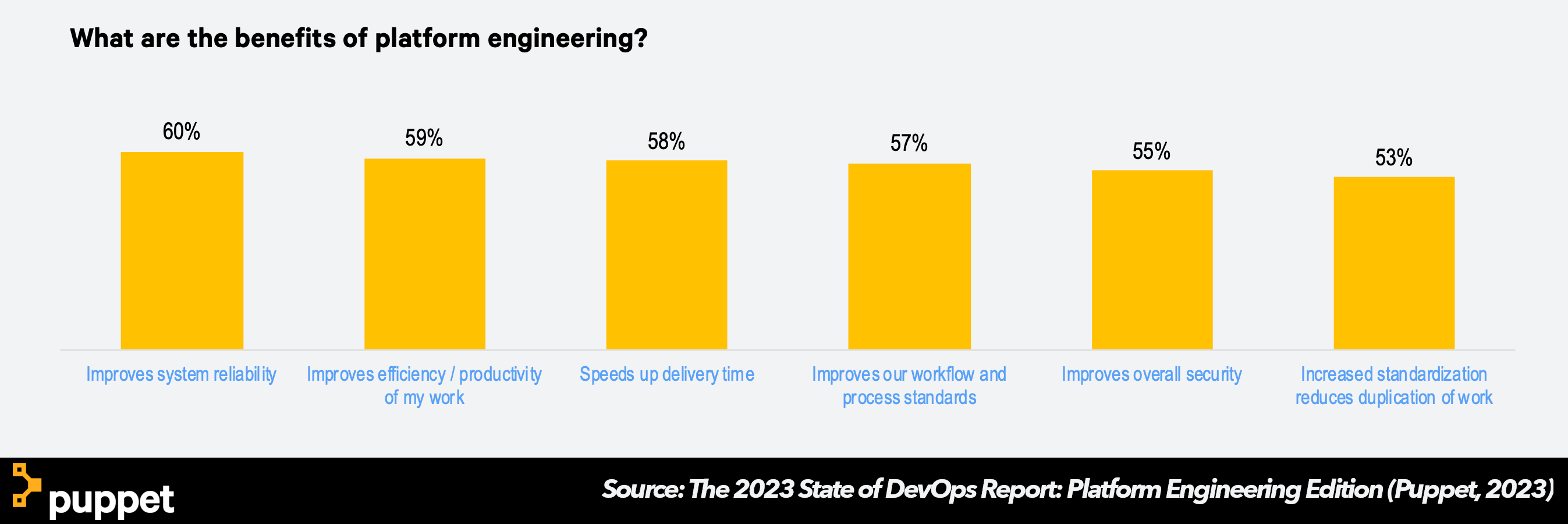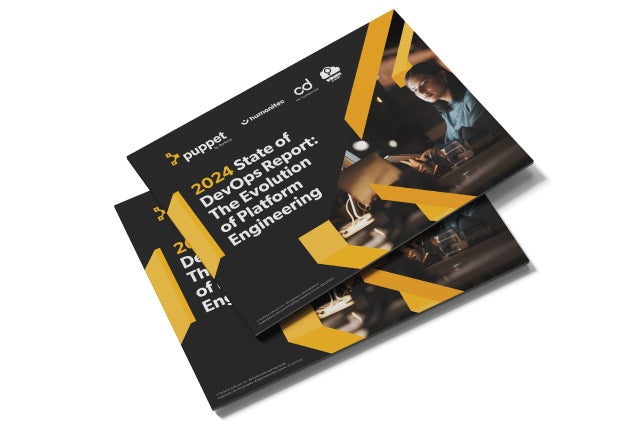Blog
February 21, 2023
Platform Engineering vs. DevOps: Yes, There's a Difference – Here's Why It Matters
Platform Engineering,
Glossary
If there’s a difference between platform engineering vs. DevOps, it’s not immediately obvious. The terms have been thrown around in conversation for long enough that it’s tempting to think of them as either the same thing or as competing concepts. So what is the difference between platform engineering vs. DevOps?
Are you “doing DevOps” when you create a developer platform? Is it called “platform engineering” if developers use self-service to work with the folks in operations? In this blog, we’ll zero in on definitions and what really differentiates platform engineering vs. DevOps. We'll also provide examples to illustrate the ways your team can improve software development and deployment with both platform engineering and DevOps.
Table of Contents
- Platform Engineering vs. DevOps: How They're Different
- What Does Platform Engineering Mean in DevOps?
- DevOps vs. Platform Engineering: An Easy Checklist
- Platform Engineer vs. DevOps Team Examples
- Infrastructure Management with DevOps vs. Infrastructure Management with Platform Engineering
- How DevOps Teams Use Platform Engineering
- How Automation Underpins Both Platform Engineering and DevOps
Platform Engineering vs. DevOps: How They're Different
The main difference between platform engineering vs. DevOps is simple. While DevOps is a development approach that helps developers and IT operations teams work together, platform engineering is a separate process used to create a single, central platform for DevOps tools.
DevOps is a conceptual mindset for defining the ways development and operations collaborate. Platform engineering is the creation of a centralized platform with defined sets of tools and workflows.
The need to collaborate among areas of an organization requires new tools for breaking down siloes. DevOps teams are historically in charge of making those choices, which means putting effort into finding and maintaining tools and workflows. We call that extra effort and responsibility “cognitive load”.
Dive into all of our great platform engineering resources in our content hub >>
Platform engineering reduces cognitive load by giving DevOps teams a central platform of tooling and workflows. The platform team chooses those tools after extensive communication with members of the dev and ops teams. That way, devs don't need to build and maintain a whole set of tools and workflows. They can just use the tools they’re given because they know they were chosen with their needs in mind.
Back to topWhat Does Platform Engineering Mean in DevOps?
Platform engineering is often implemented after a DevOps initiative has already been put in place. For that reason, platform engineering has sometimes been called a replacement for DevOps, but that’s not quite right.
Remember that catchphrase, ‘you build it, you run it’? By design, DevOps engineering forces developers to become experts in a tool if they want to use it correctly. That shouldn't be part of their core activities and responsibilities because it adds to cognitive load.
Platform engineering helps developers manage that load with structured toolchains and workflows. That way, they’re getting consistent, reliable tools (a platform) they can use to self-service and collaborate (i.e., DevOps). That helps teams avoid the confusion, frustration, and development bottlenecks that can come from too much choice.
You could say platform engineering helps teams do the deployment, operation, and monitoring elements of a DevOps cycle. Without the product focus of platform engineering, DevOps initiatives can flounder. Platform engineering tools built without DevOps collaboration in mind can lose focus. That leads to wasted investment, developer frustration, and unclear ROI.
Back to topDevOps vs. Platform Engineering: An Easy Checklist
DevOps | Platform Engineering |
DevOps is an approach to software development. | Platform engineering is the act of creating one platform for DevOps tools and workflows. |
DevOps requires a project-based mindset. | Platform engineering requires a product mindset. |
DevOps teams often pick their own tools, then they’re responsible for mastering them. | Platform engineering defines the tools DevOps teams use according to what developers want. |
DevOps touches planning, coding, building, testing, release, deployment, operations, and monitoring (the entire development and operations cycle). | Platform engineering mainly touches the deployment, operation, and monitoring elements of a DevOps cycle. |
A DevOps team usually focuses on delivering technical features of an application. | A platform engineering team is focused exclusively on identifying the tools and workflows needed by dev teams and other platform users. |
A DevOps engineer sometimes releases features straight to external audiences (like customers). | A platform engineer listens and explains the platform to internal teams. |
Platform Engineer vs. DevOps Team Examples
The teams that do platform engineering and DevOps also have distinct responsibilities and audiences. Consider these examples of platform engineer vs. DevOps roles:
- A DevOps team is focused on delivering technical features of an application (though some DevOps teams choose to define more loosely than that).
- A platform engineering team is specifically focused on building and maintaining a platform. That includes identifying the needs of the dev teams and anyone else in the organization who will benefit in using the platform.
- A DevOps team is sometimes responsible for releasing features straight to external audiences (like software customers). A platform engineer explains and evangelizes the platform to internal customers (like the DevOps team).
- A DevOps team will look at specific technical and engineering problems related to their delivery focus. A platform engineering team will look to define their platform by finding out what their customers (developers) need from it.
Infrastructure Management with DevOps vs. Infrastructure Management with Platform Engineering
The main differences between DevOps vs infrastructure management with platform engineering are that DevOps integrates infrastructure development with operations, while platform engineering creates a stable platform for developing and deploying infrastructure.
DevOps and platform engineering can both be used for infrastructure management. They differ in their approach to infrastructure management, the tools they use to do it, and the amount of automation they leverage.
DevOps unites the development and operations sides of infrastructure management, while platform engineering gives developers a self-service platform for developing and deploying infrastructure to be managed.
Back to topHow DevOps Teams Use Platform Engineering
DevOps teams often choose tools and workflows for things they aren't necessarily specialized in, like building and maintaining infrastructure. Organizations use platform engineering to reduce the number of decisions like those that DevOps teams have to make.
Particularly in larger organizations, individual teams often don’t have the breadth and depth of knowledge to pick the right tools. To use platform engineering, they hire product managers (or find them in the organization) to build a platform. Building a platform means finding and choosing the right tools and workflows based on what the organization needs and the technical feasibility of each tool.
Platform product managers should understand their internal users (devs) so they can choose the right tools and workflows based on what they actually need. Otherwise, it’ll be hard to encourage platform adoption. Those product managers also evangelize the platform and explain how it works. They'll also keep a finger on the pulse of stakeholders throughout the organization (like a product manager would) to better drive future customer needs.
Does Platform Engineering Really Drive DevOps Results?
Like DevOps, platform engineering success can be hard to measure. But the latest research shows a correlation between platform adoption and DevOps success. In fact, 94% of respondents to the 2023 State of Platform Engineering survey agree that the concept is helping their organizations better realize the benefits of DevOps.

GET THE PLATFORM ENGINEERING REPORT
Those benefits range from improvements in system reliability (60%) to greater productivity/efficiency (59%) and better workflow standards (57%). And it goes beyond making developers’ lives easier: 30% of respondents stated that platform engineering best serves the needs of the entire company – not just a single department.
Back to topHow Automation Underpins Both Platform Engineering and DevOps
For all the ways they’re distinct, platform engineering and DevOps both exist to streamline development and delivery of software. That’s why automation is vital to both initiatives.
Automation is a fundamental aspect of a DevOps initiative. It takes a lot of manual work out of humans’ jobs. It also helps them deploy updates to production faster and creates more effective feedback loops between teams.
Platform engineering goes one step further by automating tasks like infrastructure deployment from a central platform. That way, developers can focus on their own core work instead of building their own tooling and processes.
Puppet’s IT automation capabilities are essential for creating a platform engineering initiative to get the most out of your DevOps at scale. Find your starting point – or take your DevOps to the next level – with Puppet Enterprise.

